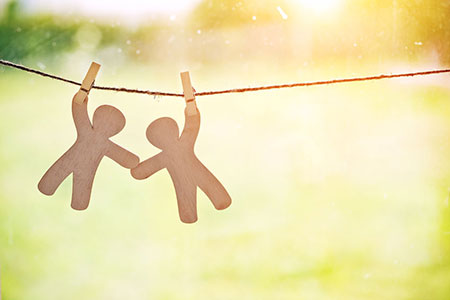selflessness
Soulmate Love Requires Patience, Hope and Perseverance
 Should I wait for him? This is a question I have been asked many times in my work. Especially when there is a deep, strong soul-to-soul love, with a sense of eternity and meaning to it, this question naturally arises when such partners are parted.
Should I wait for him? This is a question I have been asked many times in my work. Especially when there is a deep, strong soul-to-soul love, with a sense of eternity and meaning to it, this question naturally arises when such partners are parted.
The answer, I find, is within. It is not a matter of should or shouldn’t, good or bad, right or wrong, nor even a matter of the outcome. It is a matter of heart. And it is a very individual choice.
An intuitive reading can support, but not substitute the process of discovering such a personal choice. As an empathic intuitive, for example, I can offer you a description of the energy I feel around your relationship situation, to provide you with information that may help you discern. I can also support you in trusting your own heart, and then in moving forward accordingly.
But the ultimate answer always lays within your own love and desires. From my experience of love in separation, I have learned that the path of patience, if chosen, will call for a profound degree of it, along with several stepping stones of spiritual qualities and concepts to uphold it.
Love between souls is a spiritual exchange. It steps back and views the beloved through the lens of eternity. It sees the individual spirit soul – the birthless, deathless being within – who is on an evolutionary journey, passing through human experience in this world.
How To Be A Good Friend
 I just read a blog written by a spiritual person feeling angry and lonely. She had reached out to a trusted friend, but the friend only wanted to talk about her own problems. And when she did pay some attention to her plight, the best the friend could offer was to be judgmental and unsympathetic. The author then also reached out for support on a social media group for spiritually aware people. Again, all of the members did the same thing her friend did: they judged!
I just read a blog written by a spiritual person feeling angry and lonely. She had reached out to a trusted friend, but the friend only wanted to talk about her own problems. And when she did pay some attention to her plight, the best the friend could offer was to be judgmental and unsympathetic. The author then also reached out for support on a social media group for spiritually aware people. Again, all of the members did the same thing her friend did: they judged!
The woman was having problems with her abusive neighbor and many people on the forum were giving advice for her to leave. They told her to move, find a better place to live, relocate. “Moving is 100% your choice,” one person commented. The first thing I thought was no, it isn’t. This particular woman, for example, had bought the house and had put a lot of money into renovating the house. She would need to sell, at a time when not many things are selling, and possibly suffer a significant financial loss.
Some even told her to get more exercise, so that she can relax and focus on other things. They told her she was responsible for her own choice of reactions and feelings in the situation. The only insensitive, stereotypical thing they didn’t say was to take a breath and calm down. Don’t you just hate it when someone says that? It does everything, but calm you down!
The people responding, in their judgment, needed to feel superior. It was about them, not her. Her responses were defensive, understandably. I felt by her response, they made her feel more lonely. Poor woman.
Finding Peace And Strength In Trying Times
 The past few months has been a very trying time for all of us. It is easy to get worked up over where we are right now, and become anxious about the future.
The past few months has been a very trying time for all of us. It is easy to get worked up over where we are right now, and become anxious about the future.
At the beginning of the Covid-19 pandemic, a wave of fear and worry crashed over us. We were wondering if there would be ‘enough.’ Enough food, enough hand sanitizer and disinfectant, enough hospital beds, enough money to pay the bills, and even enough toilet paper! No longer were we looking to ‘keep up with the Joneses.’ Instead we were looking to make sure our households were safe and just had the basics.
During this time, I was reminded of all of the Laura Ingalls Wilder books I read as a young girl. She also lived in a time when they were not sure if they would have the necessities to live out a harsh winter. Here I was now, all these yea healthy and protected. Everyday items universe tie into all of this you may ask? Many have wondered if they were on the right path with decisions being made during this crucial time. Worrying if work will be there for you we normally would take for granted suddenly took on a new significance.
These fallout of the coronavirus pandemic, and subsequent lockdowns all over the world, have also caused many of us to wonder if we were on the right path with decisions being made during this crucial time. Many have been worrying about our jobs and businesses, and whether or not we will be able to pay our bills.
The Spiritual Symbolism Of The Pelican
 When a bird flies directly onto your path, or you see images or photos of the same bird repeatedly, within a relatively short space of time, this is often a spiritual sign that the energy of this bird is calling or guiding you.
When a bird flies directly onto your path, or you see images or photos of the same bird repeatedly, within a relatively short space of time, this is often a spiritual sign that the energy of this bird is calling or guiding you.
I live on the coast and I am lucky to be able to watch various seabirds, and encounter other birds drawn to the local water ways. The pelican is one bird that has specifically caught my attention. The day I was inspired to paint this amazing bird, he literally strutted down the hallway of my home!
Even to this day, pelican continues to literally soar into my experience whenever I need to draw on his wisdom. Even though they seem large and clumsy, there is something gentle and caring about their nature. If pelican has waddled or soared onto your path, let his wisdom and symbolism guide your way.
I started building my connection with the pelican’s energy by observing and sketching the local birds. Through the process I found a sense of awe for the pelican’s beauty, which was a shift in my perception, as I had never before considered them to be very attractive birds.
I also noticed they followed a set routine, and similar flight paths, depending on the weather. It inspired me to become more aware of my own patterns and habits. At this time my work schedule had become somewhat unbalanced and dysfunctional, without me being aware of the impact. Pelican taught me that it is vital for my self-care to ensure that I work within a routine and structure that better supports my creative outlets and energy levels.
A Letter To My Beloved Dog
 Precious Elizabeth, it has been nearly two and a half years since you left your physical vessel to live in another dimension. I know you didn’t want to go and held on long past your time – selflessly, because you had such an enormous love for me that you didn’t want to leave me.
Precious Elizabeth, it has been nearly two and a half years since you left your physical vessel to live in another dimension. I know you didn’t want to go and held on long past your time – selflessly, because you had such an enormous love for me that you didn’t want to leave me.
Always my protector, I know you couldn’t imagine that anyone other than you could be as fearless and courageous as you were during all those heartfelt times, throughout the 16 years you took care of me. I adored you and you showed your love every day in countless ways. No matter what you were doing, you always dropped everything, anytime I asked you to come to me.
Well, all but that one time!
We were rocking in the willow chairs on the far end of the portico. It was late in the afternoon, on a perfect spring day. I was relaxing in my chair, and you were asleep in your rocking chair next to mine. A big, brown bear then decided to sniff out the contents of the garbage bin at the other end of the portico. Before I had even spotted the bear, you had already leaped from your chair, apparently having smelled the enormous varmint’s odor. You flew at him as if you had wings, in order to chase him away – so protective of me you were.
Transcending Turbulence And Restoring Peace Within
 One of the most moving metaphors I have ever heard, describes the calm that rests beneath the surface of the ocean. While there may be waves and turbulence on the top, if you dive down deeper, you will come to waters that are more still.
One of the most moving metaphors I have ever heard, describes the calm that rests beneath the surface of the ocean. While there may be waves and turbulence on the top, if you dive down deeper, you will come to waters that are more still.
Similarly, the troubles of life that bring disturbance to the body, mind, and relationship dynamics of the world, occur at levels which are external to the eternal self. By going deeper, peace within can be found.
Spiritual traditions of the world define the self and the soul in varying ways. The ancient Vedic texts, for example, identifies the individual soul as measuring one ten-thousandth the size of the tip of a hair, and states that it is located in the region of the heart, seated beside the Paramatma, or Supreme Soul (God).
In the Vedic tradition, consciousness is recognized as the symptom of the soul, which is carried throughout the body by the blood, as it is circulated by the beating heart. When the heart stops and consciousness leaves the body, it is because the soul has departed.
Lord Krishna further describes in Bhagavad-gita that this atomic soul is never born, and never dies. It is immutable, unchangeable, indestructible, and always aloof from matter and its influences.
These spiritual teachings go on to highlight that the pure eternal soul is one’s real identity – the ‘I’ or ‘me’ felt by each and every living being. In this world, it has become temporarily covered by a subtle body made up of mind, intelligence, and false ego, as well as by the physical body comprised of earth, water, fire, air, and ether. In this state, the modes of material nature act upon it, and one acts out various behaviors compelled by the energies of those coverings. But the soul itself remains untouched and unaffected.
